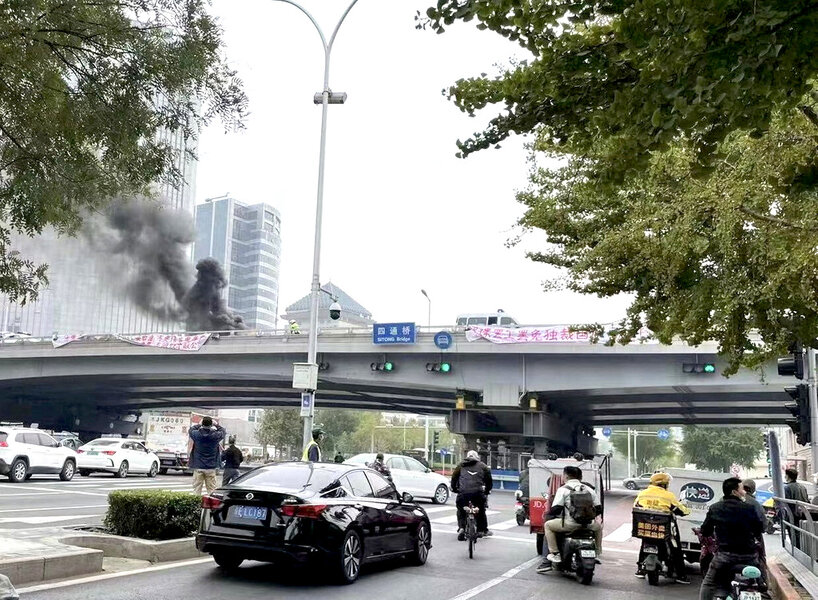From China to Iran, shoutouts for freedom
Loading...
As a protest slogan, it’s hardly new. Yet in three of the world’s most oppressed societies – China, Iran, and Russia – you can now find protesters demanding “freedom,” not just personal liberty but a civic freedom that allows individual choice in shaping governance along shared values.
The most brazen example came Thursday on a Beijing bridge. Just days before the Chinese Communist Party was set to rubber-stamp another five-year term for autocrat Xi Jinping, a man unfurled two banners over a busy highway. The hand-written banners called for “dignity, not lies,” “elections, not a great leader,” “citizens, not slaves,” and of course “freedom.”
Mind you, this rare street protest in China came after police had arrested 1.4 million people across the country over months to ensure no embarrassing dissent for the party’s giant gathering.
The protest evoked popular support on social media and a massive crackdown online by government censors. The Chinese people, political analyst Wu Qiang told The New York Times, are still not in an era where they “totally obey” Mr. Xi.
In Russia, the call for freedom started in February after the invasion of Ukraine. Protesters have demanded a right to freedom of assembly in order to protest the war – even to call it a war rather than the official “special military operation.” At least 17,000 Russians have been arrested for various sorts of protests, according to OVD-Info, an independent human rights media project.
In addition, hundreds of thousands of Russian men have protested the war by fleeing the country to avoid a harsh conscription drive. One man who fled to Kazakhstan explained why he supports freedom for Ukraine. “Russia and the Russian people need to realize that all people are equal ... that we have no choice but to live morally, without any kind of claims to an empire,” the unidentified man told Radio Free Europe.
Calls for equality and freedom often go hand in hand during protests, and that’s certainly the case in Iran over the past few weeks of mass demonstrations after the death of a young woman charged with improper head covering.
Led by thousands of fearless women throwing off their hijab, the leaderless protests are focused on unequal laws about compulsory female dress. Yet they include calls for democracy to replace the current dictatorial rule by clerics. The shorthand slogan of the protests is Zan, zendegi, azadi (“Women, life, freedom”). The rights of women and their right to life, in other words, require the freedom to ensure such rights in free and fair elections.
As in China and Russia, the rulers in Iran claim the power to enforce what they see as right and good for society. Protesters in these countries say otherwise, starting with chants and banners about freedom – and then acting as best they can, even for minutes or hours amid bullets and arrests, with the freedom they claim for themselves.







